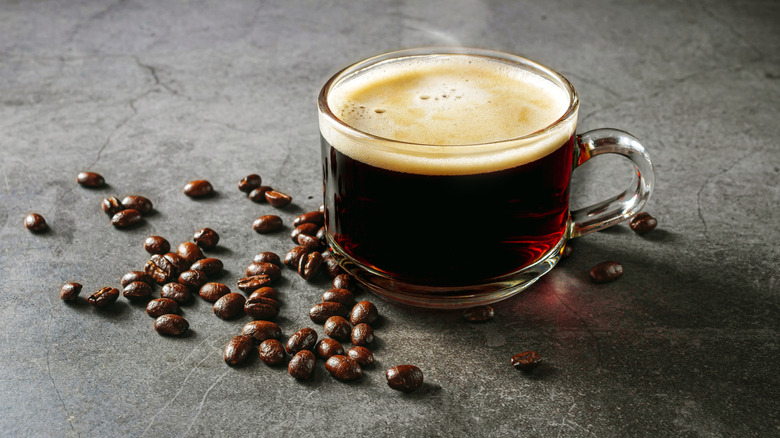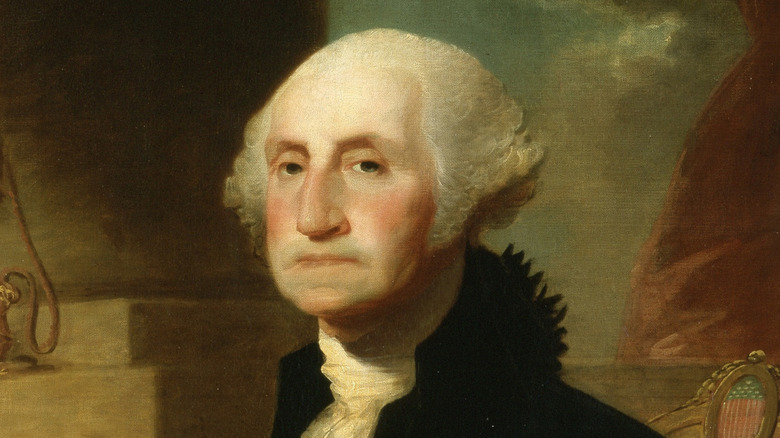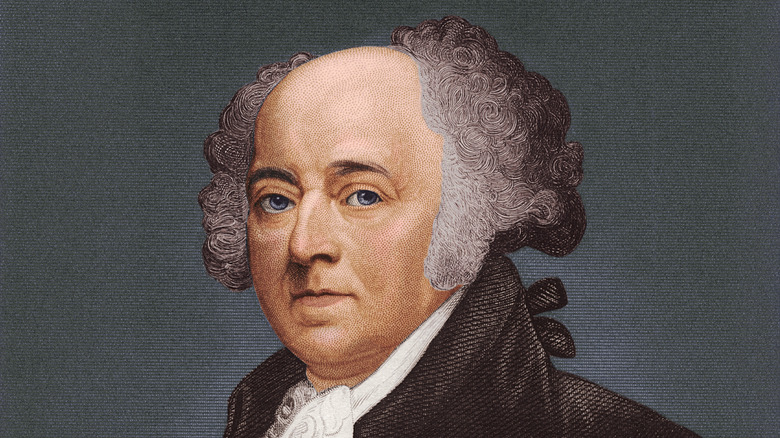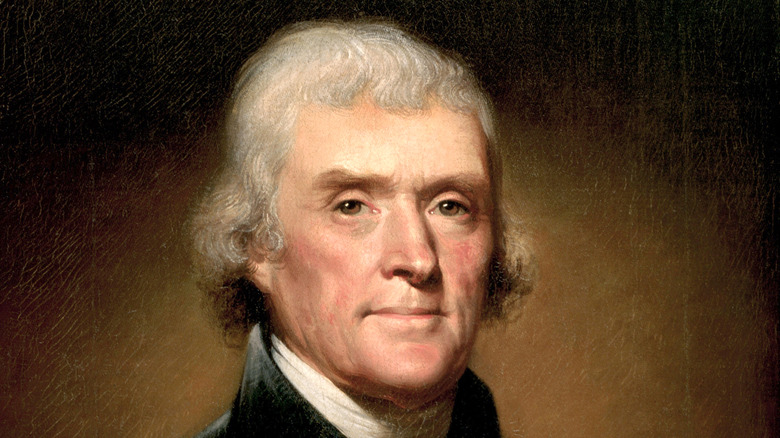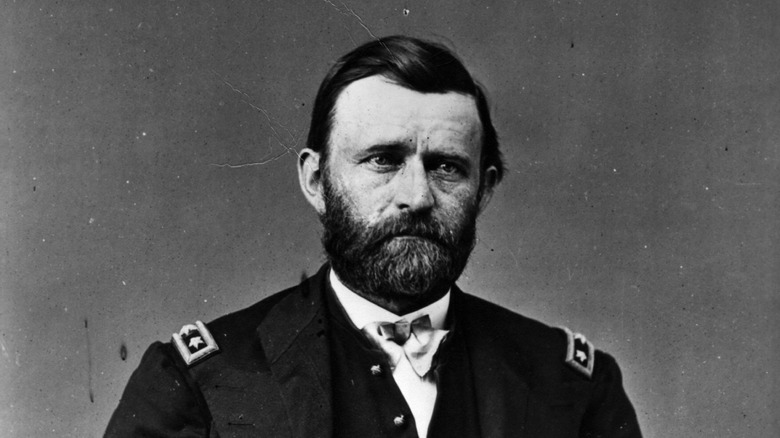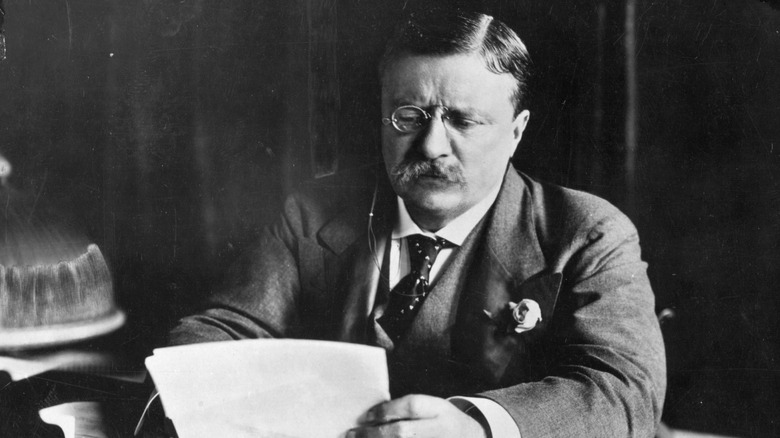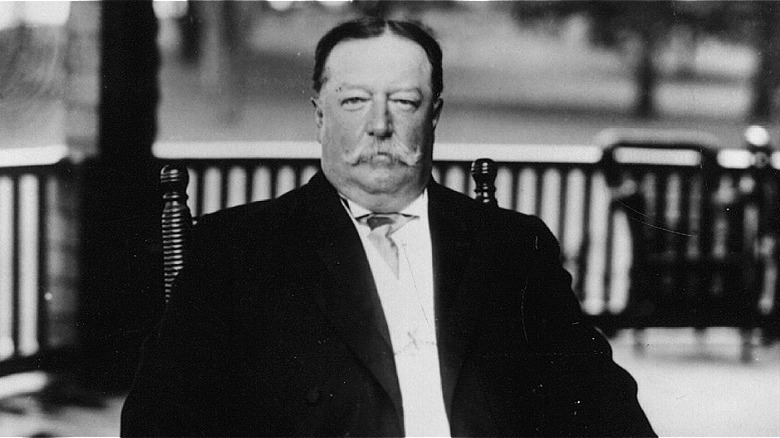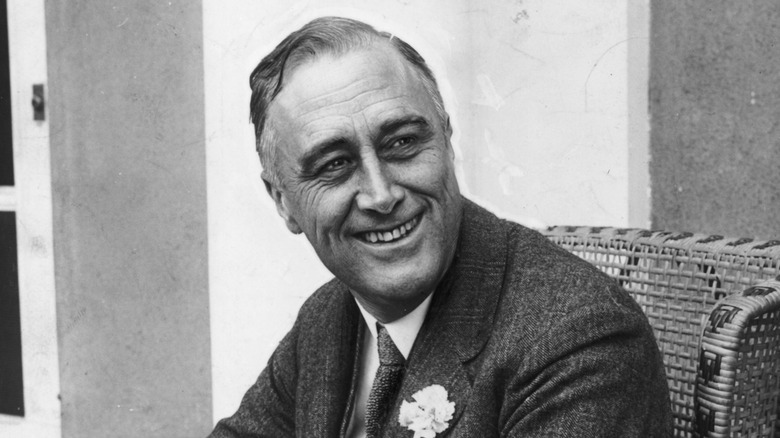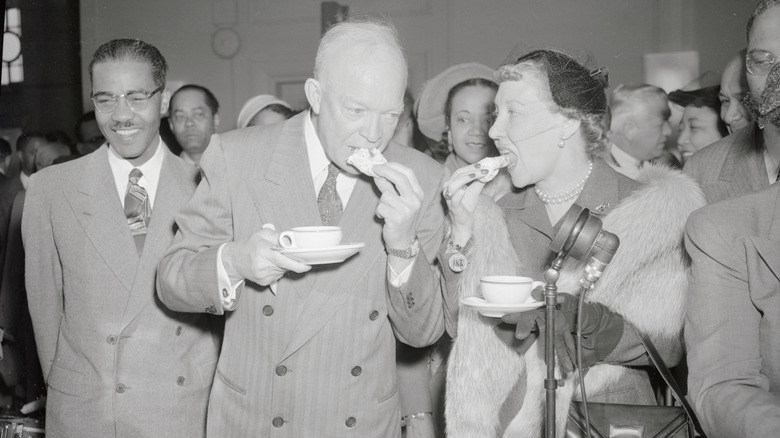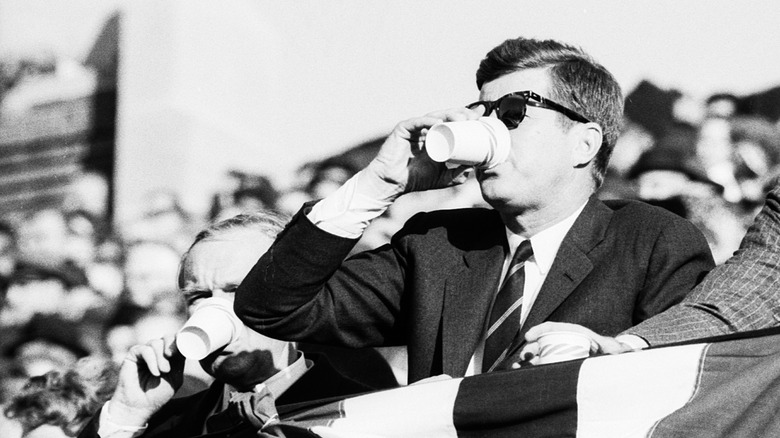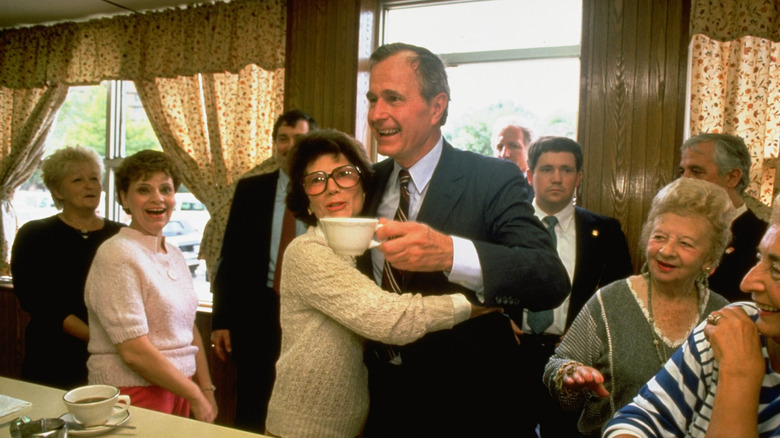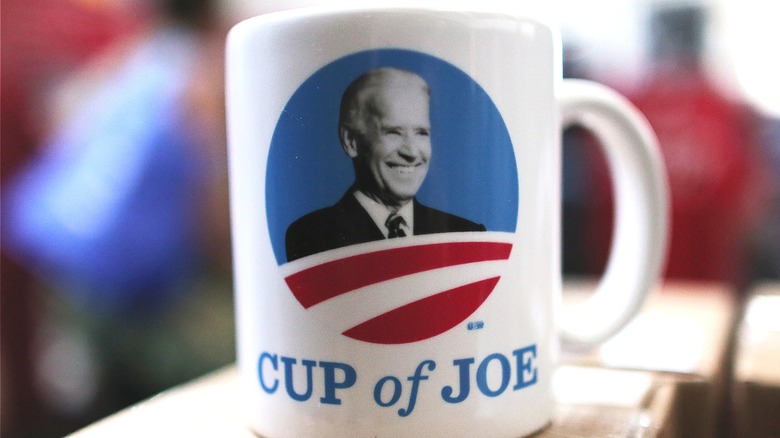The Coffee Habits Of Former US Presidents
What would George Washington have thought of a pumpkin spiced latte? Would Thomas Jefferson have ordered a vanilla sweet cream nitro cold brew? Unless someone cracks the code on time travel, we'll never know what these former presidents' contemporary coffee orders would be, but we do know that in their time, they did enjoy a cup of joe.
According to a 2025 study published by the National Coffee Association USA, two-thirds of Americans drink coffee daily. That's a lot of brewed beans. But what about the men who have held the nation's highest office? Presidents need a pick-me-up, too, which is why the Oval Office has seen its fair share of coffee drinkers across the centuries.
From caffeine addicts to those who mostly shared it with guests, the coffee habits of American presidents are varied and well-documented. We dug into some of the more interesting tales of presidential coffee consumption.
George Washington
America's history with coffee dates to before the country's founding. British merchants introduced coffee beans to Jamaica in 1728, and the commodity quickly became a valuable export in the British trade network. Still, tea was the drink of choice in England and the American colonies, in part because brewing a tasty cup of coffee could prove difficult. In a 1760 diary entry, George Washington, still some 19 years away from taking up the presidency, noted that he consumed coffee served at a social ball, which "Drinkers of coud not Distinguish from Hot water sweetned." Needless to say, that's not a rousing endorsement.
Washington must have encountered better-brewed coffee at some point, because he and his wife were known to serve it alongside tea to guests at various functions. He even had beans imported from the port of Mokha, Yemen, the same city that gave its name to the mocha coffee drink.
Martha Washington had specific instructions on how a cup of joe was to be prepared, which involved "a heaping tablespoon of good grounds per cup of water, pulverized as fine as cornmeal, served with sugar and hot milk at breakfast and only sugar after dinner." Following his second term as president, Washington was gifted several coffee plants by his son-in-law in 1799. The plants were tended at the Mount Vernon estate, where they were harvested, roasted, and ground into coffee that Martha Washington served alongside cakes and candies at her social gatherings.
John Adams
As a contemporary of Washington, John Adams had a similar relationship to coffee. Coffee grew in popularity among upper-class men in the years leading up to the American Revolution, as coffeehouses became important public meeting spaces for political discussion. Like many patriots, Adams shunned tea following the Boston Tea Party, as consuming the drink in public became a sign of one's loyalty to the British crown. "Tea must be universally renounced... I must be weaned, and the sooner, the better," Adams wrote in 1774, a year after the Tea Party.
Upon assuming presidential office, Adams softened his stance on tea, enjoying it alongside coffee, though it's believed that by this time, he preferred coffee. A personalized tea urn engraved with Adams' initials is believed to have been used for both coffee and tea, as both drinks found near equal footing in the young country, in part because coffee was used medicinally to treat digestive problems and relieve headaches.
Thomas Jefferson
While Adams grew to enjoy coffee and Washington went so far as to import it, Thomas Jefferson was the undisputed coffee king of the early American presidency. Jefferson spent plenty of time in the coffeehouses of France during his stint as the country's minister to France. He even went so far as to call coffee "the favorite beverage of the civilised world," a reference both to his personal taste and the drink's appeal to upper-class consumers.
In addition to preferring "the genuinely well ripened" coffee that came from the Caribbean, Jefferson had specific instructions for his kitchen servants on how to prepare a cup: "On one measure of the coffee ground into meal, pour three measures of boiling water. Boil it on hot ashes mixed with coal till the meal disappears from the top when it will be precipitated. Pour it three times through a flannel strainer. It will yield 2 1/3 measures of clear coffee." With no instructions related to cream or sugar, it's likely Jefferson was consistent in his taste and preferred his coffee black.
Ulysses S. Grant
While plenty of presidents after Jefferson enjoyed coffee, including James Madison, who served it at all social functions both at the White House and in his temporary residence after the British set the building ablaze, we're fast forwarding to the Civil War era and the unique coffee habits of then General Ulysses S. Grant. Like most soldiers of the time, Grant had a pretty bland palate — army rations were adequate at best.
Grant's morning routine was rather unusual, to say the least. He consumed a cup of coffee along with a "cucumber soaked in vinegar overnight." That's right, Grant fueled up for a long day of fighting Confederate forces with a cup of mud and a quick pickle.
Thankfully, by the end of the war and his later presidency, Grant transitioned to a more traditional breakfast of "broiled Spanish mackerel, steak, bacon and fried apples, flannel cakes or buckwheat cakes, and a cup of strong black coffee." Okay, so still not quite normal by our current standards, but the coffee stuck around, even if the pickle didn't make the cut.
Theodore Roosevelt
Few American presidents are surrounded in as much mystique and grandeur as Teddy Roosevelt. The ardent outdoorsman was known for his rugged, adventure-filled lifestyle, which required plenty of fuel to maintain. It's of little surprise, then, that Roosevelt was a major coffee fan.
Rumors of his coffee intake range from a gallon a day to an entire bathtub, enough to keep him in the restroom for most of his presidency, if true. Yet that tale is not the only coffee-centric myth surrounding the twenty-sixth president. In 1915, Maxwell House Coffee began using the slogan "Good to the last drop!" 15 years later, after the Maxwell House brand was sold to a new company, the advertising began to attribute the slogan to Theodore Roosevelt after he had first tasted the instant coffee at Andrew Jackson's estate in 1907.
The company ran with the idea of a presidential endorsement for years before removing the attribution. If Maxwell House came out with a bathtub-sized serving, perhaps Roosevelt would have truly given the brand his approval. Ironically, Roosevelt isn't the only president with a unique connection to instant coffee, as George Constant Louis Washington, an inventor hailing from Belgium, is credited with the first mass production of instant coffee in 1909.
William Howard Taft
You'll be forgiven for forgetting William Howard Taft when rattling off your list of presidents. He was Theodore Roosevelt's successor, and for all the ways the Bullmoose was interesting, Taft was not. That's not to say Taft was a bad president; he just wasn't a particularly interesting one. He was, however, a rather large president.
In the book "The Secrets of the White House," former housekeeper Elizabeth Jaffray said of Taft:
"A little before eight-thirty, the President and Mrs. Taft and the family would come down to the private dining room for breakfast. As a rule, he would eat two oranges, a twelve-ounce beefsteak, several pieces of toast and butter and a vast quantity of coffee, with cream and sugar. In looking through my diaries of this period, I find that on November 27th, 1911, I have a note which reads: "The President weighs 332 pounds and tells me with a great laugh that he is going on a diet but that 'things are in a sad state of affairs when a man can't even call his gizzard his own.'"
So yeah, Taft was a big guy who enjoyed a hearty breakfast washed down with a heavily dressed coffee.
Franklin Delano Roosevelt
Being a wartime president is hard and so is being a second-term president. Both are famously known to age the men in the land's highest office faster than just about anything, and yet, FDR managed to not only hold the presidency during World War II, he also did so for an unprecedented — and no longer legal — third term. How does one survive such a stressful situation? With coffee, of course.
FDR was so specific about his taste in coffee that a coffee maker was brought to him with his breakfast each morning, so he could have command of the brew and enjoy the aroma first-hand. Things got tricky when the country began rationing during the war, and First Lady Eleanor Roosevelt took it upon herself to ensure that everyone under the White House roof, including the president, was limited to a single cup of coffee per day. To get his caffeine fix, FDR began mixing a small quantity of fresh coffee grounds with dried, used ones to squeeze in a few extra cups. It may sound gross, but when you have a country to run for over a decade, sometimes you have to make sacrifices.
Dwight D. Eisenhower
While FDR was monitoring the war from the White House, Dwight D. Eisenhower was commanding Allied forces in Europe. How did the military man handle the stress? By drinking coffee and smoking to excess.
It's a small miracle that Eisenhower lived to the age of 78, considering that he was known to drink between 15 and 20 cups of coffee a day in addition to smoking up to four packs of cigarettes. For Ike, both the coffee and the smokes were vices meant to calm his frayed nerves during high-stress moments like the invasion of Normandy, but his reliance on caffeine and nicotine didn't end with his military career.
Eisenhower kept up his prodigious consumption well into his presidency, even as he suffered multiple heart attacks and other health concerns. Eisenhower died from congestive heart failure in 1969, and it's logical to suspect the coffee and cigarettes had something to do with it.
John F. Kennedy
For all of the coffee-drinking presidents in history, John F. Kennedy was one of the first to weaponize the morning beverage as a political tool. It began with Kennedy's 1952 run for a Senate seat in his home state of Massachusetts, when his mother, Rose, along with JFK's sisters, hosted a series of in-person "teas" with female voters around the state. For Kennedy's reelection campaign in 1958, the event moved to television, where it was dubbed "Coffee with the Kennedys." The televised format, filmed on a set dressed to look like the Kennedy family home and hosted by Rose, allowed voters to call in and ask the senator questions.
The gambit was so successful that for the 1960 presidential election against Richard Nixon, the campaign again turned to televised sit-downs with JFK, this time called "Coffee with Senator and Mrs. Kennedy." While Kennedy's official coffee order isn't public record, most sources agree that he took the beverage black and would pair the bitter drink with a Cuban cigar when time allowed.
George H. W. Bush
Eisenhower and Teddy Roosevelt are locked in as the two most highly caffeinated presidents on record, but George H. W. Bush gave both a run for their money. By his own account, Bush started his day with a coffee around 5:15 am when he let his dogs outside, and that was the first mug of many. According to accounts, he drank coffee throughout the day, sometimes up to 10 cups of regular joe before he called it a night.
In 1991, Bush was diagnosed with a thyroid condition that forced him to give up caffeine on the doctor's orders. Bush tried switching to decaf but hated the taste and reportedly began slowly reintroducing regular coffee into his routine only two weeks after leaving the hospital.
The 41st president was also the first to push for American-grown coffee to be served in the White House. Kona Coffee, from Hawaii, was served at special functions during Bush's presidency and has since become the go-to coffee of the White House.
Barack Obama, Joe Biden, and Donald Trump
While there are plenty of coffee lovers in the annals of presidential history, not all past and present occupants of the Oval Office are coffee fans. Barack Obama hardly ever drinks coffee, instead preferring the occasional green tea or straight water. Meanwhile, Obama's former vice president, Joe Biden, is known to enjoy his coffee black, which is appropriate for a man named Joe.
The current occupant of the White House, Donald Trump, doesn't drink coffee at all. Instead, Trump opts for a steady stream of Diet Coke throughout the day. Of course, Trump rarely misses out on a marketing opportunity, so Gold Roast Coffee is available on the Trump Store website, just in case you wanted to try a coffee blend from a non-coffee drinker. Statistically, the next president is more likely to be a coffee drinker than not, so a pro-pumpkin spice president might be just around the corner.
